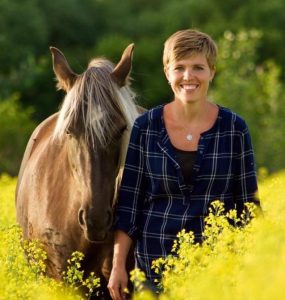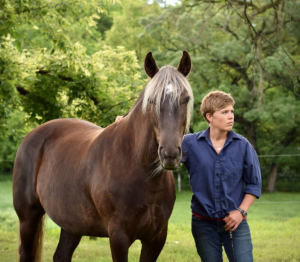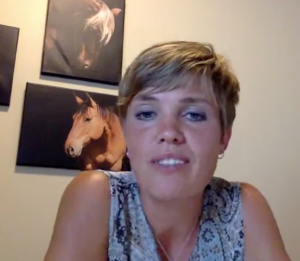
Join our Cayuse Corona Community
Editor’s Note: We welcome Elaine Sanders as a new Cayuse Corona Community contributor. Elaine is an Equine Partnership Coach, Stress Consultant, and born horse enthusiast living in rural Manitoba, Canada. She has a degree in Nursing, a certification in Equine Partnered Psychotherapy and Coaching, and is a certified HeartMath Coach. She teaches others how to be calm, composed, and confident so that they can not only be successful with their horses, but also so that they can have meaningful relationships with their equine friends. Elaine combines sound science with horse sense to help you have the partnership of your dreams. Learn more here.
Leave a comment and you’ll be automatically entered to win giveaways. Learn more here.
Elaine writes:

Elaine Sanders
There is pandemic going around. But I’m not referring to COVID-19, but something even more toxic, more contagious, and with further reaching effects.
It’s fear.
This fear has swept around the world, has infiltrated social media, has splintered communities, split families, and has possibly gripped your very own heart. Fear of death. Fear of loss. Fear of the unknown. Fear of change. Fear of judgement, ridicule, being different. Fear of the future.
Fear presents in different ways. It can feel like denial, uncertainty, anxiety, frustration, or overwhelm. It can feel like resignation, anger, blame, worry, or hostility. There are many faces of fear, but they all come from the same root.
While all this might sound over-dramatic, take a moment right now to reflect, have you been infected by fear in some shape or form?
“What does this have to do with my horse?”
 The answer is best understood through analogy. Have you ever encountered one scary thing with your horse and have it impact your entire ride? Has your horse ever been scared of one thing and then been jumpy and agitated for the rest of your interaction? Of course. That’s because fear, anxiety, uncertainty, and other negative emotions carry over.
The answer is best understood through analogy. Have you ever encountered one scary thing with your horse and have it impact your entire ride? Has your horse ever been scared of one thing and then been jumpy and agitated for the rest of your interaction? Of course. That’s because fear, anxiety, uncertainty, and other negative emotions carry over.
Just as that happens in your horse, it happens for you. What you’re experiencing away from the barn can affect every area of your life, including your horse partnership.
While researchers and scientists are working on getting us through one pandemic, it’s up to us to get through the fear pandemic. But we’re not alone. Horses can teach us a great deal about conquering fear.
Horses are hard-wired for fear. That’s how they survive. But they don’t live in fear. They move beyond it. Here are the six steps to conquer fear as taught by the horses.
Step 1. Retreat and Reflect
When horses are scared of something, it can help them if we lead them away from the scary thing and let them look at it with two eyes from a safe distance. It’s never helpful to ignore that they’re sacred, discipline them for being scared, or push them on without dealing with it.
Do the same for yourself. Retreat and reflect. Retreating from a situation is not the same thing as running away. It’s simply that you’re getting some space between you and this situation so that you can regroup. Find stillness and solitude to be with yourself in this scary time. Then reflect on what is actually going on inside. All too often we numb, ignore, and push down our feelings with busyness, substances, or distractions. Don’t ignore your emotions. Don’t punish yourself for feeling them. Don’t blindly push through. There’s a big situation going on. It’s ok to feel some level of fear, uncertainty, anxiety, or overwhelm. But just as you don’t want your horse to stay in that heightened sense of fear, you don’t want to stay in that state either.
Step 2. Reconnect with Heart
 Have you ever been on a horse so scared that you could hear their hammering heartbeat as it rocked their entire body and yours? Emotions affect physiology – the heart is erratic, the systems enter disharmony, and the brain goes offline (that’s why your horse cannot think straight when he’s scared). The horse needs to find physiological calm.
Have you ever been on a horse so scared that you could hear their hammering heartbeat as it rocked their entire body and yours? Emotions affect physiology – the heart is erratic, the systems enter disharmony, and the brain goes offline (that’s why your horse cannot think straight when he’s scared). The horse needs to find physiological calm.
While your fear can affect your heart rate – causing it to beat hard and fast – it also causes much more subtle effects like a heart rhythm that is disordered and erratic. This may be less perceptible, but it’s still measurable. Researchers call this erratic rhythm incoherence and it impacts your brain. That’s why, just like your horse, you can’t think straight when you’re upset, depressed, anxious, or frustrated.
In order to get your brain working again, you have to get out of your head and reconnect with your heart. Focus your attention on the heart wherever and whenever you feel anxious, fearful, frustrated, uncertain, or disappointed. Try it right now. Bring your focus down to your heart. And find calm there.
Over the next week, try practicing Steps 1 & 2. Give yourself the time and space to retreat, reflect, and reconnect with your heart. We’ll be back next week with Steps 3 to 6 on how to conquer fear.